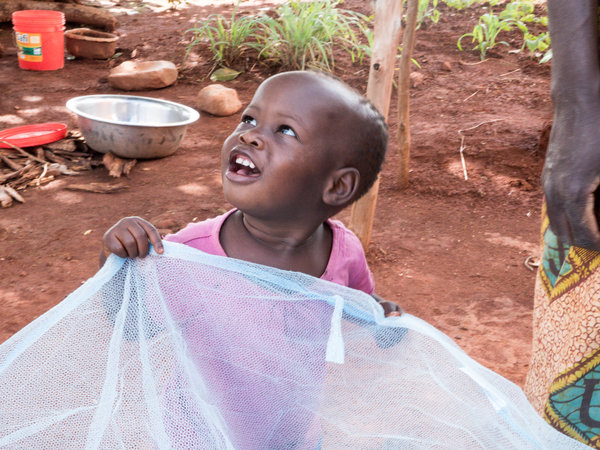Young children whose caregivers heard or saw the messages of the “Healthy Mother, Happy Baby” anti-malaria campaign in Liberia were more than twice as likely to receive prompt treatment with antimalarial medication for a fever, according to new research from the Johns Hopkins Center for Communication Programs.
The findings, published online in March in Malaria Journal, suggest that specific messages shared across radio spots, brochures and posters may convince caregivers to quickly seek immediate treatment in a local health facility – a step that can save a child’s life if he or she has malaria.
Health experts recommend that young children who live in regions where malaria is common should be taken immediately to a health facility if they develop fever, as it is often the first symptom of the deadly mosquito-borne illness. Health providers at these facilities who suspect or diagnose malaria can then treat children with an artemisinin-based combination therapy (ACT), which is the class of drugs recommended for uncomplicated malaria.
“Health programs are always trying to figure out what is keeping children from getting prompt treatment and what the barriers are to increase ACT uptake,” says Grace Awantang, a monitoring and evaluation advisor at CCP. “What we see here is that communication may influence the decision-making process among caregivers whose young children develop fever.”
In 2010, malaria was responsible for approximately 41 percent of deaths among children under five in malaria. That same year, the Rebuilding Basic Health Services Project launched “Healthy Mother, Happy Baby,” a social and behavior change communication campaign on which CCP assisted. The campaign encouraged people to get immediate treatment in a health facility for a febrile child, give a child with a fever a sponge bath and understand how to detect a fever.
For the study, Awantang and her colleagues from CCP and Liberia’s Ministry of Health analyzed data from a household survey conducted in 2014 in four counties in Liberia. They specifically examined responses from 607 female caregivers whose children under five had been sick in the previous two weeks before the survey.
They found that those mothers who recalled hearing or seeing, in the previous six months, the phrase “Healthy Mother, Happy Baby were significantly more likely to have received ACTs for their child, regardless of whether they heard other anti-malaria campaigns, than those who could not recall hearing any malaria messages.
Other factors were at play, Awantang cautions, such as the distance to a health facility, whether the nearest facility was stocked with ACTs and cost of medication, but she says the data suggest that the message to promptly seek care for fever may have done its job.
“We are trying to figure out the best ways to get mothers to take their children to health facilities for necessary care,” she says. “This study suggests that memorable communication campaigns can help.”
“Correlates of social behavior change communication on care-seeking behaviors for children with fever: an analysis of malaria household survey data from Liberia” was written by Grace Awantang, Stella Babalola, Hannah Koenker, Kathleen Fox, Michael Toso, Nan Lewicky, Daniel Somah and Victor Koko.
The study was funded under the Health Communication Capacity Collaborative project, funded by the United States Agency for International Development under the President’s Malaria Initiative via cooperative agreement AID-OAA-A-11-00068.





